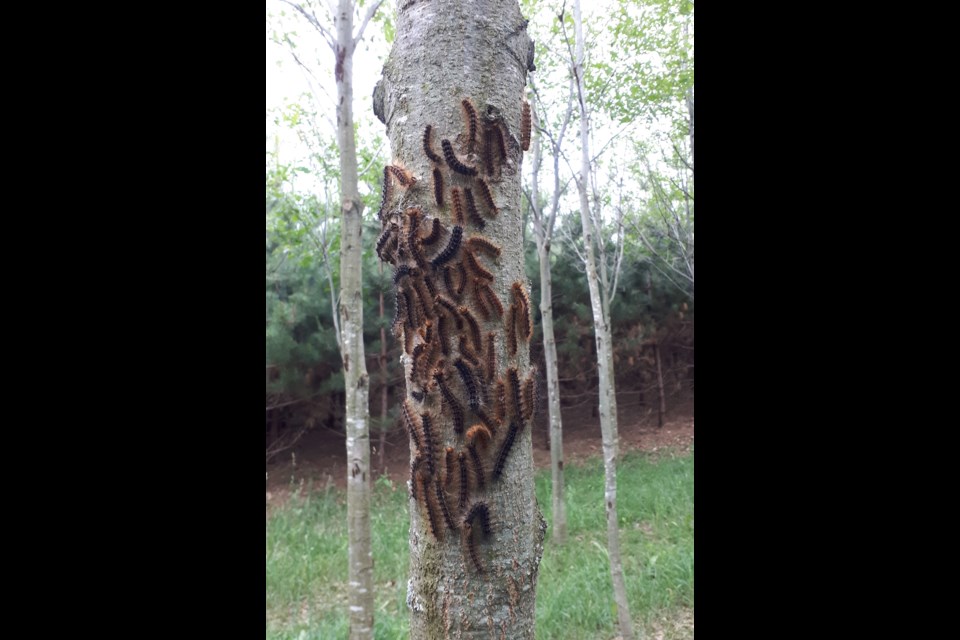With residents voicing concerns regarding Tiny's handling of this summer's gypsy moth infestation, council requested that an expert be brought in to provide some insight as to what aerial spraying is, and what the township can do going forward.
Paul Zimmer, president and operations manager of Zimmer Air Services Inc., declared to council that he was neither there to sell his spray program, to defend BTK spraying nor to debate science.
“I’m primarily here because I was requested by Coun. Mintoff to present some facts relating to what a municipality would do as far as a gypsy moth control program,” Zimmer stated in regards to the previous regular meeting of council.
During the half-hour presentation, Zimmer described how effective the aerial spray application of proven pesticides, such as Foray 48B, or BTK, were at controlling LDD (also known as European gypsy moths) during severe periods of infestation such as the widespread damage and defoliation of trees that occured seemingly everywhere this year.
“There’s no debate on the science or safety of this product,” Zimmer exclaimed. “It is one of the most safely, widely-accepted and studied pesticides on the planet, and continues to be supported by the PRMA (Canadian Pest Management Regulatory Agency), the EPA (Environmental Protection Agency), local health authorities, and in most countries where rigorous safety regulations exist.
According to Zimmer, bias, anti-spray groups and politics are the driving factors opposing BTK use.
“I personally cannot believe that Health Canada has a hidden agenda or is in the pockets of ‘big corp,’ which I hear all too often.”
“Having said that, BTK does affect other lepidoptera, but only if they are in the larva stage feeding in the area that was sprayed at the same time,” said Zimmer. “We always get ‘oh, you’re killing all the caterpillars’, and that isn’t the case.”
He also conveyed how time-consuming it would be for a company to set up a private program within a municipality.
“We have to get a buy-in from every individual, we have to gauge whether neighbours want to get in on the program or whether they’re against the program,” said Zimmer.
Zimmer mentioned how bylaws are just one tool municipalities can use to define how control programs work for residents.
“I believe Tiny passed a bylaw this year requiring residents to accept liability if they were planning to spray LDD," he said. "To sum up, we’re happy to work with any municipality, whether it’s private or a municipal-run program.
"What we’re not interested in doing is large-scale private programs in municipalities. Cottagers on a single road along a lakeside is one thing, but to do subdivisions inside municipalities on a private program is just too difficult, too time-consuming, and too costly for us.”
Coun. Gibb Wishart asked if there was a cut-off date when a township could back out of an agreement for aerial application, such as if LDD suffered a colony collapse through virus or fungal infection.
As BTK is built for use and is not meant to be shelved, Zimmer stated that March was his company’s annual deadline for accepting aerial application requests.
Council continued the conversation into the notices of motion for previous discussion for which Zimmer was invited to stay.
Mintoff impressed the necessity to do something for the residents.
“When it comes to the feedback that I’ve received as a councillor, I would say that anecdotally at least 95% of the people that have contacted me were in favour of spraying, and possibly higher. When I think of the rights of protecting those people who were opposed to spraying, I look to our water program.
“When our water systems expanded that were supplied by private wells, we forced those people to join our system because we felt that that was the right thing to do,” Mintoff said, mentioning it being a case “from the perspective of the greater good”.
Mintoff’s proposal to council was that a list of things for staff to do could be provided quickly, to give hope to residents so that they wouldn’t suffer in years ahead. Council continued to debate what would be required, with the discussion involving data collection of egg masses to determine LDD population statuses being heavily weighed.
Although Mintoff’s motion was defeated 2-2 (with Cornell and Hastings as the nays), a new motion by Cornell was offered: to convene a special meeting of council where the Severn Sound Environmental Association (SSEA) and Ministry of Natural Resources and Forestry (MNRF) and the county forester could provide a presentation.
Mintoff also requested that a short survey be added to the township's website asking residents if they supported a municipal spraying program in heavily affected areas, and if they supported the expenditure of funds for such. The amended motion was carried unanimously.
Archives of council meetings are available to view on Tiny township’s YouTube channel.
